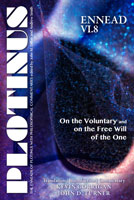
Titles by Kevin CORRIGAN-John D. TURNER
|
|

 |
PLOTINUS Ennead VI.8:
On the Voluntary and
on the Free Will
of the One
Translation, with an Introduction, and Commentary
THE ENNEADS OF PLOTINUS
—WITH PHILOSOPHICAL COMMENTARIES
Series Edited by
John M. Dillon and Andrew Smith
November 2017
978–1–930972–39-1
501 pages • 5 x 7.5 • Paperback
$47.00
|
|
 |
Kevin Corrigan
is the Samuel Candler Dobbs Professor of Interdisciplinary Humanities in Middle Eastern and South Asian Studies, Classics, Philosophy and Religion at Emory University, Atlanta, Georgia. His recent work is focused on ancient and early medieval thought, particularly Plato, Aristotle, Plotinus and later Neoplatonism, on the one hand, and the Cappadocians, Evagrius, Augustine, on the other.
|
 |
John D. Turner
is the Cotner Professor of Religious Studies and Charles J. Mach University Professor of Classics and History at the University of Nebraska-Lincoln. He specializes in the study of ancient Gnosticism, in particular the restoration, conservation, translation, and interpretation of the thirteen fourth-century papyrus codices from Nag Hammadi, Egypt.
|
|
|
|
|
|
|
|
|
|
|
|

|
|

|
|
Ennead VI.8 gives us access to the living mind of a long dead sage as he tries to answer some of the most fundamental questions we in the modern world continue to ask: are we really free when most of the time we are overwhelmed by compulsions, addictions, and necessities, and how can we know that we are free? Can we trace this freedom through our own agency to the gods, to the Soul, Intellect, and the Good? How do we know that the world is meaningful and not simply the result of chance or randomness?
Plotinus’ On the Voluntary and on the Free Will of the One is a groundbreaking work that provides a new understanding of the importance and nature of free human agency. It articulates a creative idea of agency and radical freedom by showing how such terms as desire, will, self-dependence, and freedom in the human ethical sphere can be genuinely applied to Intellect and the One while preserving the radical inability of all metaphysical language to express anything about God or gods.
Introduction to the Treatise (PDF excerpt) Plotinus was a Platonist, committed to expounding the doctrines put forward by Plato some seven centuries earlier. He was born and educated in Egypt, where he studied the teachings of Plato under the guidance of Ammonius Saccas. He came to Rome in 244 CE and built up a circle of followers devoted to studying Plato through Plato's own works and those of philosophers, both Platonist and non-Platonist, of the intervening centuries. From his fiftieth year Plotinus himself wrote down, in Greek, the findings of the seminars, and these writings were later edited by one of his pupils, Porphyry, and published in six groups of nine treatises entitled the Enneads (from the Greek word for nine – ennea).
|
|
“Ennead VI.8 [38] is a unique treatise in Plotinus’s work, in so far as it constitutes a turning point in philosophy which, perhaps under the influence of Porphyry, introduces a new way of thinking about God. Hence the interest of this new translation with commentary by John Turner, an excellent authority on Platonically influenced Gnosticism, and by Kevin Corrigan, who has done much work on Plotinus and the great authors of early Christianity.” |
—Luc Brisson, Director of Research
Jean Pépin Centre, CNRS (France)
|
|
“Kevin Corrigan and John Turner continue in the best tradition of this series, providing a fresh path for Plotinus’ understanding of voluntary action and the nature of free agency. Voluntary action concerns human action as free from an external principle, including one’s desires and imagination. This account of human action leads to the ‘rash argument’ (VI.8.7), which restricts freedom to the human sphere, leaving out Soul, Intellect, and the One. In part this is a Stoic notion, but it also rests on Plotinus’ account of the peculiar situation of the human soul. Plotinus' task is then to defend the free agency of Soul and Intellect in terms of their self-determination, but more importantly to ground that self-determination in the One. VI 8.8–12 discusses the One negatively as having none of the limitations of Intellect or Soul, while VI.8.13–21 looks at the One positively as free in a way that goes beyond being and intellect, a kind of willing that makes it free and principle of freedom in Intellect and Soul. Corrigan and Turner give a closely argued account, with ample coverage of Plotinus’ context.” |
—Gary M. Gurtler, SJ,
Associate Professor of Philosophy
Boston College |
|
“This is a clear and helpful guide to one of the most interesting of Plotinus's Enneads. The authors combine insightful philosophical commentary with useful explanations of the intellectual background and of key terms. This book is essential reading for anyone interested in ancient views of freedom or in ancient conceptions of divinity.” |
—Ursula Coope, Professor of Ancient Philosophy
Corpus Christi College, Oxford |
|
“Tractate VI.8 [39], one of the most profound in the corpus, has Plotinus engaging with the problem of free will at both the human and the divine level. The issue is complex since it involves predicating positive attributes of the One or Good while also keeping within the constraints of negative theology. Corrigan and Turner are an experienced team, well suited to the task of dealing with the more complex issues in the philosophy of the Enneads. Their substantial introduction places the tractate in its wider as well as its more immediate context, and the commentary eases our way into Plotinus’ arguments by articulating them in considerable detail before clarifying them by appeal to ways of reasoning familiar to contemporary readers.” |
—Suzanne Stern-Gillet, Professor of Ancient Philosophy,
University of Bolton |
|
|
|
|
|
|

